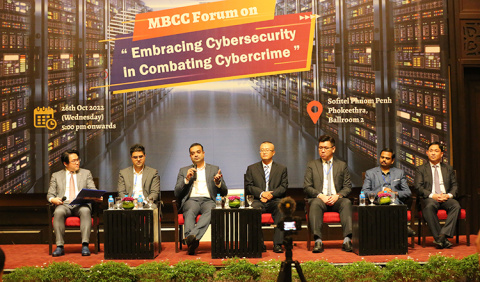
The ever-increasing cybercrimes in the world pose a great threat to the smooth progression of corporates across the world, and the companies in Cambodia have also been facing the menace in various forms.
In a bid to help corporates tackle cybercrime professionally, the Malaysian Business Chamber of Cambodia (MBCC) recently organised a forum ‘Embracing Cybersecurity in Combating Cybercrime’. In the event held at Sofitel Phnom Penh Phokeethra, cybersecurity experts discussed various aspects of the issue and urged businessmen to be aware of and take steps to combat cybercrime.
The event was attended by Chea Vandeth, Minister of MPTC; Datuk Eldeen Husaini Mohd Hashim, Malaysian Ambassador to Cambodia; and Oknha Tan Khee Meng, President of MBCC and around 300 guests from government institutions and private companies representing banking, insurance, telecommunications, internet service providers, chambers of commerce and business associations.
Panellists who attended the first session on ‘Embracing Cybersecurity’ include Ou Phannarith, Director of Information and Communications Technology (ICT) Security of Ministry of Posts and Telecommunications (MPTC); Sumit Nangia, Chief Customer Experience and Digital Officer of AIA (Cambodia) Life Insurance Plc; Asitha De Costa, Chief Information Officer of EZECOM Co Ltd; Hai Li, Director of Cybersecurity, Public Affairs and Communications Department of Huawei Technologies (Cambodia) Co Ltd; Gilbert Chu Kim Foong, Chief Operating Officer of LGMS Berhad and Kalyan Achyutuni, Chief Information Officer of Smart Axiata Co Ltd.
The second session discussion was on ‘Combating Cybercrime’ and the panellists were Rodgio Araujo, Director of Engineering of Edotco (Cambodia) Co Ltd; Fong Choong Fook, Executive Chairman, Cybersecurity Consultant and Trainer of LGMS Berhad; Asitha De Costa, and Kalyan Achyutuni.
Vandeth said the talk was designed for information, communications, technology and cybersecurity experts to share their technical knowledge and experience with business leaders and employees on cybersecurity.
“To maintain our day-to-day operations and mitigate the impacts of the pandemic, the government, enterprises, academia and individuals have been forced to change traditional ways of working, communicating and learning to online activities that are more vulnerable to cyberattacks,” said Vandeth.
Phannarith said that implementation of cybersecurity frameworks and compliance regulations would depend on the development of corporate cybersecurity based on corporate business objectives that determines the scope of the cybersecurity they should cover.
“Cybersecurity is led by industries as it always happens before the government issues regulations and there are many standards of cybersecurity to comply such as national, industry, regional and international standards. As a regulator, we will design our regulations that benchmark the international practices
that are aligned with industry and national ones,” said Phannarith.




